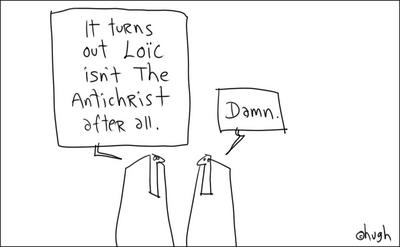
It’s been a week since LeWeb. Here’s my take on what the past several days have been like:
- Firestorm!
- Fired?
- Acceptance and Wisdom
I have to give Loic LeMeur some credit. He took some chances. Yes, he sure pissed off a lot of people. But taking risks is inherently controversial. But it is never boring.
What were the upsides and downsides of Loic taking the risks that he did? Here are a few.
Risk upside: Having politicians talk to the attendees. Some bloggers complained that they felt used. Come on. How often do you get the chance to hear Shimon Peres talk about how bloggers represent the new intelligentsia? Was he pandering? Perhaps. But more so, his presence at LeWeb3 shows how far we have come as bloggers. He was there because bloggers are an important part of the public discourse. Seems more like reason to celebrate. Very cool.
Risk downside: Fitting in the politicians meant less time to hear from people I really wanted to see spend more time presenting. For instance, people like Hugh Macleod and Anina, who presented about love and fashion 2.0. They had a great sense of humor while providing all kinds of insights into the fashion world and how in the end, it all comes down to love. A love for what you do. That may sound a bit corny but Hugh sums it up well on his blog:
<blockquote>6. The best blogging campaigns are acts of love.
You cannot impose your own selfish values upon the blogosphere and still expect results.
What you can do, however, is give a damn. It’s a surprisingly effective strategy.
7. I will leave you with a thought from Six Apart’s Anil Dash, talking about the speech the Father of The Bride made at his wedding:
“What he told us is that, in the end, only love matters. Success and fame and wealth and even health all fade in time, and in the end all you have is love. And love is what matters. I hope everyone in the world gets the chance to discover that in the way that I have. I love you, Alaina.”
This market and communication transition we’re going through is not about technology, and it sure as hell isn’t about marketing. It’s about Love. Love enabled. Love re-asserting itself in the business between people.</blockquote>
Risk Upside: Organizing a start-up room in the final weeks before the conference. More than 50 companies presented. Many of the entrepreneurs presenting were from Europe, giving a glimpse of the innovation from a side of the world that we do not often see here in the US.
I have more to say about the start ups. But for now, I just want to congratulate Loic for coming through with a conference that had lots of risks and with it excitement for us all.



 Posted by marshallk
Posted by marshallk 








